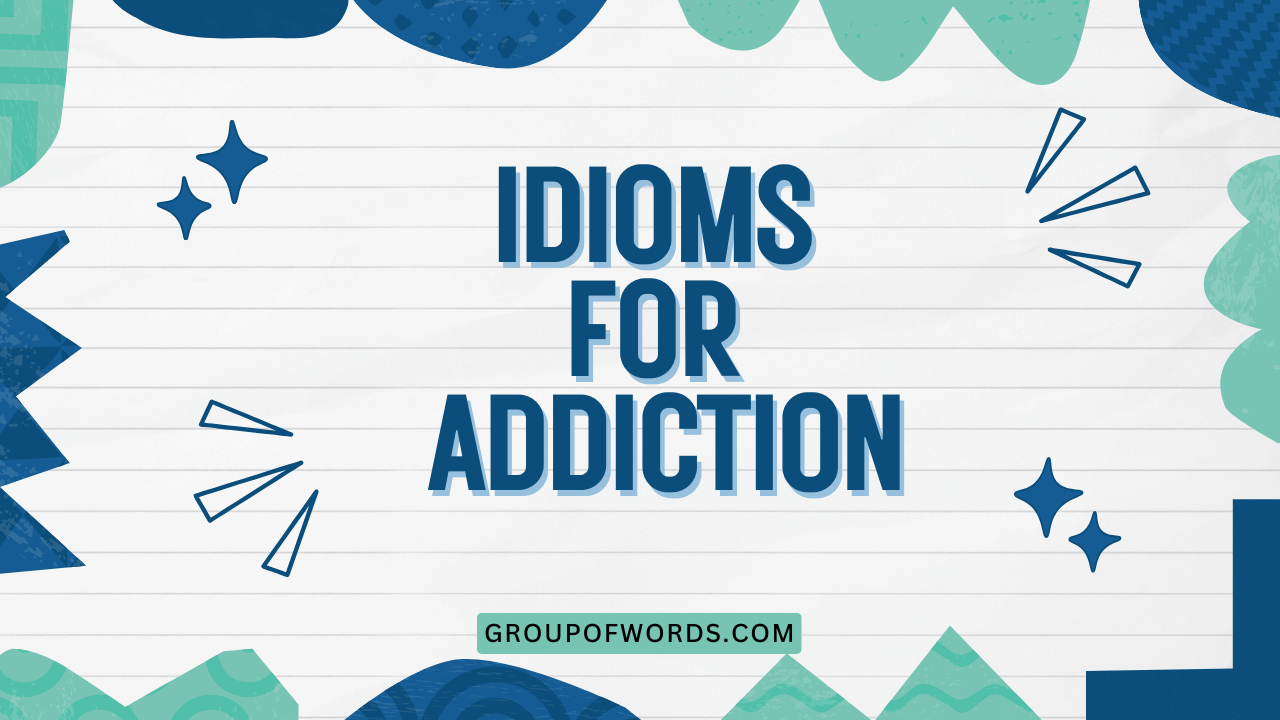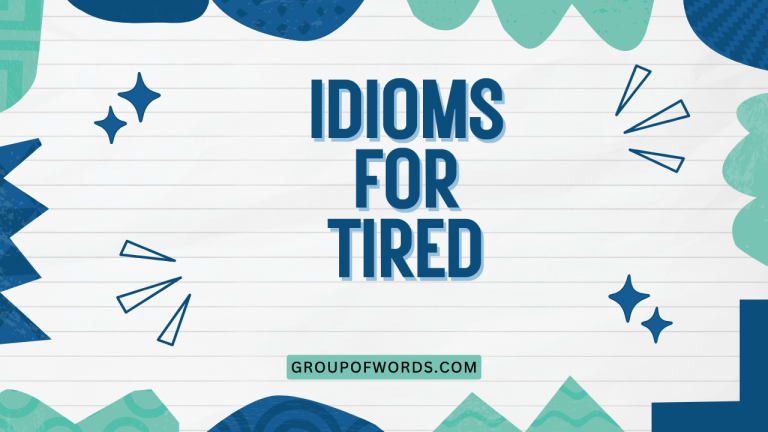Idioms for Addiction: Understanding Common Phrases
Understanding idioms is crucial for mastering English, as they add color and depth to communication. Idioms related to addiction are particularly important because they frequently appear in discussions about substance abuse, recovery, and related social issues.
This article explores a variety of idioms used to describe addiction, providing definitions, examples, and practical exercises to help you understand and use them correctly. This guide will benefit English language learners, educators, and anyone interested in expanding their vocabulary and comprehension of nuanced English expressions.
Table of Contents
- Introduction
- Definition of Idioms for Addiction
- Structural Breakdown
- Types and Categories of Addiction Idioms
- Examples of Idioms for Addiction
- Usage Rules for Addiction Idioms
- Common Mistakes with Addiction Idioms
- Practice Exercises
- Advanced Topics
- FAQ Section
- Conclusion
Definition of Idioms for Addiction
Idioms are expressions whose meanings cannot be understood from the literal meanings of the individual words. They are figurative phrases that have acquired a specific meaning over time through common usage. In the context of addiction, idioms often describe the intense cravings, behaviors, and consequences associated with substance abuse or compulsive habits. These idioms can be colorful, impactful, and often carry cultural nuances that are important to understand. Idioms related to addiction frequently appear in news reports, literature, and everyday conversations about health and social issues.
Understanding idioms for addiction is essential for several reasons. First, it enhances your ability to comprehend spoken and written English, especially in contexts related to health, social issues, and personal struggles.
Second, using these idioms correctly can make your communication more expressive and engaging. Finally, it demonstrates a deeper understanding of the cultural aspects of the English language.
Structural Breakdown
The structure of idioms related to addiction can vary widely. Some idioms are simple phrases, while others are more complex clauses.
Understanding the structural components of these idioms can help you recognize and use them correctly. Here’s a breakdown of common structures:
- Verb + Preposition: Many idioms consist of a verb followed by a preposition, such as “fall off the wagon.”
- Noun + Verb: Some idioms are structured as a noun followed by a verb, like “monkey on one’s back.”
- Adjective + Noun: Others consist of an adjective and a noun, such as “slippery slope.”
- Phrasal Verbs: These are combinations of a verb and a particle (preposition or adverb) that create a new meaning, e.g., “kick the habit.”
The key to understanding the structure of idioms is recognizing that the individual words do not contribute directly to the overall meaning. Instead, the phrase as a whole conveys a specific, figurative concept.
For example, “fall off the wagon” does not literally mean to fall from a horse-drawn carriage; it means to relapse after a period of abstinence.
Types and Categories of Addiction Idioms
Addiction idioms can be categorized based on the aspect of addiction they describe. Below are some common categories:
Describing the Addiction Itself
These idioms describe the state of being addicted or the substance of addiction.
Describing the Act of Becoming Addicted
These idioms describe the process of developing an addiction.
Describing the Struggle with Addiction
These idioms describe the challenges and difficulties of battling addiction.
Describing Recovery
These idioms describe the process of overcoming addiction and maintaining sobriety.
Describing Relapse
These idioms describe the act of returning to addictive behavior after a period of abstinence.
Examples of Idioms for Addiction
Here are examples of idioms related to addiction, categorized by their specific meaning.
Idioms Describing the Addiction Itself
This table provides idioms that directly describe the state of being addicted or the object of addiction.
| Idiom | Meaning | Example Sentence |
|---|---|---|
| Monkey on one’s back | A heavy burden or problem, especially an addiction. | He finally managed to get the monkey off his back after years of struggling with alcoholism. |
| Hooked | Addicted to something, unable to stop using it. | She got hooked on painkillers after her surgery and found it hard to quit. |
| Junkie | A person with a severe drug addiction. | The streets were filled with junkies struggling to find their next fix. |
| Chasing the dragon | Smoking heroin by inhaling the fumes. | He was chasing the dragon, trying to recapture the high he had experienced before. |
| Crackhead | A person addicted to crack cocaine. | The crackhead was desperate for his next hit. |
| On the needle | Injecting drugs intravenously. | He was on the needle for years before seeking treatment. |
| Habit | A dependence on a substance or activity. | She developed a serious habit of smoking cigarettes to cope with stress. |
| Fix | A dose of an addictive drug. | He needed his daily fix to feel normal. |
| User | Someone who uses addictive substances. | Many users struggle with the social stigma of their addiction. |
| Dope | An illegal drug. | He was caught selling dope on the street corner. |
| Under the influence | Affected by drugs or alcohol. | He was arrested for driving under the influence. |
| High | A state of euphoria caused by drugs. | She was trying to get high to escape her problems. |
| Wasted | Extremely intoxicated. | He got completely wasted at the party. |
| Addicted | Physically or mentally dependent on a substance or behavior. | She realized she was addicted to social media and decided to take a break. |
| Dependent | Needing something, often a substance, to function normally. | He became dependent on alcohol after a traumatic event. |
| In the grip of addiction | Controlled by an addiction. | He was in the grip of addiction, unable to break free from his cravings. |
| Chasing a high | Trying to recreate an initial, intense experience with a drug. | He kept using drugs, always chasing a high that he could never quite reach again. |
| Feeding the habit | Providing the substance needed to sustain an addiction. | He was feeding the habit by spending all his money on drugs. |
| In the throes of addiction | Experiencing the intense effects and cravings of addiction. | She was in the throes of addiction, battling withdrawal symptoms. |
| On the skids | In a state of decline due to addiction or other problems. | He ended up on the skids after losing his job and turning to drugs. |
| Climbing the walls | Feeling restless and anxious, often due to withdrawal. | He was climbing the walls during his first week of sobriety. |
| Jonesing | Experiencing intense cravings for a drug. | He was jonesing for a cigarette after quitting smoking. |
| Dying for a fix | Experiencing extreme cravings for a drug. | He was dying for a fix and would do anything to get one. |
| Tied to the bottle | Dependent on alcohol. | He was tied to the bottle and couldn’t imagine life without drinking. |
| Under the influence | Affected by drugs or alcohol. | She made a bad decision while under the influence. |
Idioms Describing the Act of Becoming Addicted
This table provides idioms that describe the process of developing an addiction or starting down the path of addiction.
| Idiom | Meaning | Example Sentence |
|---|---|---|
| Slippery slope | A course of action that seems harmless but leads to serious consequences. | Experimenting with drugs can be a slippery slope. |
| Get hooked | Become addicted to something. | He got hooked on gambling after winning big at the casino. |
| Fall into the habit | Develop an addiction gradually. | She fell into the habit of drinking wine every night after work. |
| Give in to temptation | Succumb to a strong urge or desire. | He gave in to temptation and started smoking again after a year of being clean. |
| Go off the deep end | Become completely irrational or uncontrolled, often due to substance abuse. | He went off the deep end when he mixed alcohol with his medication. |
| Get a taste for something | Begin to enjoy something, often leading to dependence. | He got a taste for the excitement of gambling and couldn’t stop. |
| Start down the wrong path | Begin making choices that lead to negative consequences. | He started down the wrong path when he began hanging out with the wrong crowd. |
| Open Pandora’s Box | Unintentionally create a situation that causes many problems. | Legalizing certain drugs could open Pandora’s Box, leading to widespread addiction. |
| Take the bait | Be lured into something, often with negative consequences. | He took the bait and tried the drug, not realizing how addictive it would be. |
| Dip one’s toes in | Experiment with something cautiously, often leading to further involvement. | He dipped his toes in the world of gambling and quickly became addicted. |
| Go down the rabbit hole | Enter a bizarre or difficult situation, often leading to further complications. | She went down the rabbit hole of online gambling and lost all her savings. |
| Get in too deep | Become overly involved in a situation, making it difficult to escape. | He got in too deep with his drug habit and couldn’t quit on his own. |
| Cross the line | Exceed a limit or boundary, often with negative consequences. | He crossed the line when he started using drugs at work. |
| Give way to temptation | Yield to a strong urge or desire. | She gave way to temptation and had a cigarette after months of quitting. |
| Start using as a crutch | Rely on a substance or behavior to cope with problems. | He started using alcohol as a crutch to deal with his anxiety. |
| Get a foot in the door | Gain initial access to something, often leading to further involvement. | He got a foot in the door with drugs through his friends. |
| Fall prey to | Become a victim of something harmful. | She fell prey to peer pressure and started using drugs. |
| Get a taste of | Experience something briefly, often leading to a desire for more. | He got a taste of the excitement of gambling and became addicted. |
| Open the floodgates | Unleash a large amount of something, often with negative consequences. | Legalizing marijuana could open the floodgates to addiction. |
| Take a liking to | Begin to enjoy something, often leading to dependence. | He took a liking to the feeling of being drunk and started drinking more often. |
| Get caught in a web | Become entangled in a complicated and difficult situation. | He got caught in a web of addiction and lies. |
| Tread a dangerous path | Follow a course of action that is likely to lead to negative consequences. | She was treading a dangerous path by experimenting with drugs. |
| Go down the drain | Be wasted or lost, often due to bad choices. | His life started to go down the drain when he became addicted to drugs. |
| Get sucked in | Become involved in something against one’s will. | He got sucked in to the world of drug abuse by his friends. |
Idioms Describing the Struggle with Addiction
This table provides idioms that describe the challenges, difficulties, and hardships of battling addiction.
| Idiom | Meaning | Example Sentence |
|---|---|---|
| Fight a losing battle | Struggle against something that is impossible to overcome. | He felt like he was fighting a losing battle against his addiction. |
| Walking a tightrope | Being in a precarious or risky situation. | Recovering addicts are walking a tightrope, always at risk of relapse. |
| Hit rock bottom | Reach the lowest point in one’s life. | He hit rock bottom when he lost his family and his job due to his drinking. |
| Clawing your way back | Making a difficult and determined effort to recover. | He was clawing his way back to a normal life after years of addiction. |
| Battling demons | Fighting against inner struggles, often related to addiction or mental health. | She was battling her demons as she tried to stay sober. |
| In the trenches | Engaged in a difficult and challenging situation. | The therapists were in the trenches, helping addicts overcome their struggles. |
| Going cold turkey | Stopping an addictive substance abruptly and completely. | He decided to quit smoking by going cold turkey. |
| Going through withdrawal | Experiencing the unpleasant symptoms of stopping an addictive substance. | She was going through withdrawal and felt very sick. |
| Hang by a thread | Be in a very precarious or unstable situation. | His sobriety was hanging by a thread after a stressful week. |
| Ride the storm | Endure a difficult situation until it passes. | He had to ride the storm of his cravings in the early days of recovery. |
| On the wagon | Abstaining from alcohol. | He is on the wagon and attending AA meetings regularly. |
| Between a rock and a hard place | Faced with two difficult choices. | He was between a rock and a hard place, needing drugs but knowing they were destroying his life. |
| Walking on eggshells | Being very careful not to upset someone or cause a problem. | His family was walking on eggshells around him, afraid of triggering a relapse. |
| Going to hell and back | Experiencing extreme suffering and hardship. | He went to hell and back during his addiction and recovery. |
| Clinging to sobriety | Making a strong effort to maintain abstinence. | She was clinging to sobriety with all her might. |
| Swimming upstream | Struggling against a powerful force or trend. | He felt like he was swimming upstream trying to stay clean in his old neighborhood. |
| Struggling to stay afloat | Having difficulty surviving or maintaining one’s position. | He was struggling to stay afloat financially due to his addiction. |
| Living on the edge | Living a risky or dangerous lifestyle. | He was living on the edge, constantly risking relapse. |
| Fighting tooth and nail | Making a fierce and determined effort. | He was fighting tooth and nail to overcome his addiction. |
| At wit’s end | Having exhausted all resources and options. | His family was at wit’s end trying to help him overcome his addiction. |
| Against the ropes | In a difficult or defensive position. | He felt like he was against the ropes, struggling to stay sober. |
| In dire straits | In a very difficult or dangerous situation. | She was in dire straits due to her addiction. |
| Up against it | Facing a difficult challenge. | He was up against it trying to quit drugs. |
| Walking a fine line | Behaving in a way that is risky or requires careful judgment. | He was walking a fine line between sobriety and relapse. |
Idioms Describing Recovery
This table provides idioms that describe the process of overcoming addiction, achieving sobriety, and maintaining a healthy lifestyle.
| Idiom | Meaning | Example Sentence |
|---|---|---|
| Turn over a new leaf | Start behaving in a better way. | He decided to turn over a new leaf and get sober. |
| Get clean | Become free from addiction. | She finally got clean after attending rehab. |
| Dry out | Become sober, especially after a period of heavy drinking. | He went to a clinic to dry out. |
| Start afresh | Begin again in a new and better way. | He wanted to start afresh after getting clean. |
| Back on track | Returning to a normal or desired state. | He was finally back on track after overcoming his addiction. |
| On the mend | Recovering from an illness or difficulty. | She was on the mend after completing her addiction treatment. |
| See the light | Understand something clearly, often leading to a change in behavior. | He finally saw the light and realized he needed to get help. |
| Get a new lease on life | Have a new opportunity to live life in a better way. | Overcoming his addiction gave him a new lease on life. |
| Find a way out | Discover a solution to a difficult problem. | He was determined to find a way out of his addiction. |
| Beat the habit | Overcome an addiction. | She was proud to say that she had beaten the habit. |
| Keep on the straight and narrow | Behave in an honest and morally correct way. | He was determined to keep on the straight and narrow after getting clean. |
| Put the past behind you | Forget about past mistakes and move forward. | He needed to put the past behind him and focus on his recovery. |
| Make a fresh start | Begin again with a clean slate. | She decided to make a fresh start in a new city after getting sober. |
| Come a long way | Make significant progress. | He had come a long way since starting his recovery journey. |
| Get your act together | Start behaving responsibly and effectively. | He knew he needed to get his act together to stay sober. |
| Turn things around | Change a situation for the better. | He managed to turn things around after hitting rock bottom. |
| Climb out of the hole | Escape from a difficult situation. | She was determined to climb out of the hole of addiction. |
| Get back on your feet | Recover from a setback and become stable again. | He was working hard to get back on his feet after rehab. |
| See the light at the end of the tunnel | Begin to see signs of hope after a long period of difficulty. | He was finally seeing the light at the end of the tunnel in his recovery. |
| Build a new life | Create a better and more fulfilling life. | She was working hard to build a new life free from addiction. |
| Stay the course | Continue with a plan or action despite difficulties. | He knew he had to stay the course to maintain his sobriety. |
| Keep your head above water | Manage to survive in a difficult situation. | He was just trying to keep his head above water in the early days of recovery. |
| Take control of your life | Assume responsibility for your own actions and decisions. | She decided to take control of her life and seek help for her addiction. |
| Get a grip | Regain control of your emotions or behavior. | He needed to get a grip to stay sober. |
| Make amends | Do something to correct a past mistake. | He was trying to make amends to those he had hurt during his addiction. |
Idioms Describing Relapse
This table provides idioms that describe the act of returning to addictive behavior after a period of abstinence or recovery.
| Idiom | Meaning | Example Sentence |
|---|---|---|
| Fall off the wagon | Relapse after a period of abstinence from alcohol. | He fell off the wagon after a stressful week at work. |
| Slip up | Make a mistake or relapse. | She slipped up and had a cigarette at the party. |
| Backslide | Revert to a worse state or condition. | He started to backslide into his old habits. |
| Relapse | Return to a former condition, especially after improvement. | She experienced a relapse after several months of sobriety. |
| Go back to square one | Return to the beginning, having made no progress. | His relapse meant he had to go back to square one. |
| Lose your footing | Lose stability or control. | He lost his footing and started using drugs again. |
| Stumble | Make a mistake or error. | She stumbled on her path to recovery and had a drink. |
| Return to your old ways | Revert to former habits or behaviors. | He returned to his old ways after a fight with his family. |
| Cross the line again | Exceed a limit or boundary that was previously respected. | He crossed the line again when he started gambling. |
| Hit a bump in the road | Experience a temporary setback. | She hit a bump in the road but was determined to get back on track. |
| Fall from grace | Lose status or respect, often due to a mistake. | He fell from grace after his relapse became public. |
| Go astray | Deviate from the correct path. | He went astray and started using drugs again. |
| Take a tumble | Experience a sudden fall or setback. | She took a tumble when she relapsed. |
| Go off the rails | Begin to behave in a wild or uncontrolled manner. | He went off the rails after losing his job. |
| Open old wounds | Revive painful memories or experiences. | Visiting his old neighborhood opened old wounds and triggered a relapse. |
| Fall back into old habits | Revert to former routines or behaviors. | She fell back into old habits and started smoking again. |
| Regress | Return to a less developed state. | He regressed after experiencing a traumatic event. |
| Lose your grip | Lose control of your emotions or behavior. | He lost his grip and relapsed after a stressful day. |
| Take a step backward | Make less progress than before. | His relapse was a step backward in his recovery. |
| Succumb to temptation | Give in to a strong urge or desire. | He succumbed to temptation and had a drink. |
| Go back to the bottle | Return to drinking alcohol excessively. | He went back to the bottle after a period of sobriety. |
| Wander off course | Deviate from the intended path. | She wandered off course and relapsed. |
| Give in to cravings | Yield to strong desires for a substance. | He gave in to cravings and used drugs again. |
| Break your sobriety | Violate a commitment to abstinence. | He broke his sobriety after a year of being clean. |
Usage Rules for Addiction Idioms
Using idioms correctly requires understanding their specific meanings and contexts. Here are some general rules to follow:
- Context is Key: Ensure the idiom fits the situation you are describing. For example, “fall off the wagon” is specific to alcohol relapse, not drug relapse.
- Know the Nuances: Be aware of the emotional tone conveyed by the idiom. Some idioms are more informal or humorous, while others are serious and somber.
- Avoid Overuse: Using too many idioms can make your language sound unnatural or forced.
- Consider Your Audience: Ensure your audience understands the idioms you are using. If you are speaking to non-native English speakers, it may be best to avoid idioms altogether.
- Maintain Consistency: Once you start using an idiom, stick to its correct form. Avoid mixing idioms or creating variations.
Important Considerations: It’s also essential to be sensitive when discussing addiction. Using idioms can sometimes trivialize the struggles of those affected. Choose your words carefully and be mindful of the impact they may have.
Common Mistakes with Addiction Idioms
Many learners make mistakes when using idioms. Here are some common errors to avoid:
| Incorrect | Correct | Explanation |
|---|---|---|
| He fell from the car. | He fell off the wagon. | “Fall off the wagon” is the correct idiom for relapsing after abstaining from alcohol. |
| She got monkey on her back. | She has a monkey on her back. | The correct phrase is “have a monkey on one’s back.” |
| He is walking on eggs. | He is walking on eggshells. | The correct idiom is “walking on eggshells,” not “walking on eggs.” |
| She hit the rock. | She hit rock bottom. | The correct idiom is “hit rock bottom,” not “hit the rock.” |
| He turned a new leaf over. | He turned over a new leaf. | The correct idiom is “turn over a new leaf,” not “turn a new leaf over.” |
| She is on the mendings. | She is on the mend. | The correct idiom is “on the mend,” not “on the mendings.” |
Practice Exercises
Test your understanding of addiction idioms with these exercises.
Exercise 1: Fill in the Blanks
Complete the following sentences with the correct idiom from the list below.
Idiom List: monkey on his back, slippery slope, hit rock bottom, turn over a new leaf, on the wagon
| Question | Answer |
|---|---|
| 1. After losing his job and his family, he finally __________. | hit rock bottom |
| 2. He decided to __________ and start attending AA meetings. | turn over a new leaf |
| 3. He’s been __________ for six months now and feels much better. | on the wagon |
| 4. His gambling addiction became a __________ that he couldn’t shake. | monkey on his back |
| 5. Experimenting with drugs can be a __________. | slippery slope |
| 6. After years of addiction, he wanted to __________ and start a new life. | turn over a new leaf |
| 7. Losing everything due to addiction made him realize he had __________. | hit rock bottom |
| 8. He finally managed to get the __________ of addiction off his back. | monkey on his back |
| 9. Starting with casual drinking can be a __________ to alcoholism. | slippery slope |
| 10. He is determined to stay __________ and never drink again. | on the wagon |
Exercise 2: Matching
Match the idiom with its correct meaning.
| Idiom | Meaning |
|---|---|
| 1. Go cold turkey | a. Revert to former habits |
| 2. Fall off the wagon | b. Reach the lowest point |
| 3. Hit rock bottom | c. Stop abruptly |
| 4. Return to your old ways | d. Relapse after abstinence |
| 5. Get clean | e. Become free from addiction |
Answers: 1-c, 2-d, 3-b, 4-a, 5-e
Advanced Topics
Delving deeper into the realm of addiction idioms reveals more complex aspects of their usage and cultural significance. Here are some advanced topics to consider:
- Regional Variations: Some idioms may have different meanings or be more common in certain regions or dialects of English. Understanding these regional variations can help you communicate more effectively in diverse settings.
- Historical Context: The origins of some addiction idioms can be traced back to historical events or cultural practices. Exploring the historical context of these idioms can provide a deeper understanding of their meaning and usage.
- Literary Usage: Many authors use addiction idioms in their works to add depth and authenticity to their characters and narratives. Analyzing how these idioms are used in literature can enhance your appreciation of both the language and the story.
- Social and Ethical Implications: The use of addiction idioms can have social and ethical implications, particularly when discussing sensitive topics such as substance abuse and recovery. Being mindful of these implications can help you communicate more responsibly and respectfully.
FAQ Section
Frequently Asked Questions About Idioms for Addiction
What is an idiom?
An idiom is a phrase or expression whose meaning cannot be understood from the literal meanings of its individual words. It is a figurative expression that has acquired a specific meaning through common usage.
Why is it important to learn idioms related to addiction?
Learning idioms related to addiction is important because they frequently appear in discussions about substance abuse, recovery, and related social issues. Understanding these idioms can enhance your comprehension of spoken and written English and make your communication more expressive.
How can I improve my understanding of addiction idioms?
You can improve your understanding of addiction idioms by studying examples, practicing usage, and paying attention to how they are used in context. Reading books, watching movies, and listening to conversations that deal with addiction can also be helpful.
Are there any resources available to help me learn more about addiction idioms?
Yes, there are many resources available to help you learn more about addiction idioms, including dictionaries, online articles, and language learning websites. Additionally, seeking guidance from a language teacher or tutor can be beneficial.
Can idioms be used in formal writing?
While idioms are more commonly used in informal contexts, they can sometimes be appropriate in formal writing if they enhance the message and are used judiciously. However, it is important to consider your audience and the overall tone of your writing before using idioms in formal settings.
Conclusion
Mastering idioms related to addiction is a valuable skill for anyone looking to enhance their English proficiency and cultural understanding. By understanding the definitions, structures, and usage rules of these idioms, you can communicate more effectively and sensitively about the complex issues surrounding addiction.
Remember to practice regularly and be mindful of the context and audience when using these expressions. With dedication and effort, you can confidently incorporate addiction idioms into your vocabulary and improve your overall communication skills.






